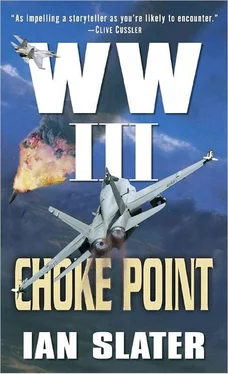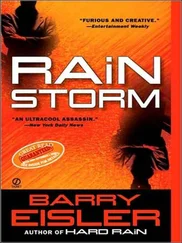“We’ll go in the quieter water, wait till this rain passes,” Alvaro assured Choir, indicating a natural rock-strewn, crescent-shaped harbor off to their left on the port quarter. The harbor, about a half mile across and several hundred yards deep, was fed by a massive, flood-controlled waterfall, about fifty feet high and three hundred feet wide, plunging precipitously from the hundred-foot-high cliffs that ran the whole curve of the beach, forming a vine- and bush-covered amphitheater. It looked as if the side of a volcanic seamount had been blown out eons before.
Choir raised one hand in thanks to Alvaro as the RIB passed through the pummeling surf, his other hand still white from gripping the roll bar. The rough forty-three-mile trip out from Port Angeles had convinced Freeman even more how difficult and, frankly, how useless David Brentwood would have been in the rough weather.
In less than four minutes the RIB’s shallow draft keel passed over a sandbar covered in a foot or so of water, and the six men immediately felt the change, their grips on the hold bars relaxing, the roar of the cataracts plunging all along the cliffs a welcome sound after the constant, bullying roar and buffeting of the open sea. Aussie became excited for a moment, pointing to something man-sized in one of the many channels that ran out from under the heavily vegetated cliffs in the area. A second later he saw the figure reappearing from behind the curtain of the waterfall into one of the water channels.
“Seal!” said Salvini.
“Sea lion,” Aussie corrected him.
Freeman took his cell phone from its double Ziploc bag and called Admiral Jensen at Keystone, the much-relieved COMSUBPAC-GRU-9 commander telling the general that the NR-1B’s two scientists, two officers, and three enlisted men had just arrived at Keystone. Jensen didn’t bother to bore the general with the “screw-up,” as the Marine CO had succinctly described the fracas between the Navy’s Skate and the Washington Ferry Corporation’s captain.
Now that he’d found nothing after having put a “rush” on the NR-1B, Freeman felt a rare of case of embarrassment. For his part, Jensen was annoyed, to put it mildly — after all the trouble he’d gone to get the research sub to the West Coast. Then again, Freeman had been the only one who’d offered to help him when he was getting flak from everyone for not having assured a “mine free” strait. And it was Freeman, Jensen knew, who’d given him credit, via CNN, for the fifty-seven-mile coast rerun by Darkstar. So the admiral said nothing, other than to tell Freeman that the NR-1B would be ready if and when Freeman found anything. Besides, there was still a lot the NR-1B could do, the consensus in the Pentagon being that it was the craft best suited to hunt down another small sub.
Freeman glimpsed the sparkle of light beyond the lacy edge of the mammoth waterfall. The nanosecond of recognition was followed by his shouted warning to the other five on the RIB. Whether Aussie, Choir, Salvini, and the diver, Peter Dixon, like the general himself, had reacted more quickly than coxswain Alvaro because of their long combat experience was impossible to discern. Perhaps it was because Alvaro was the most visible, standing up at the RIB’s steering console. In any event, it was Jorge who took the full burst of machine-gun fire, its sparkle of one-in-four tracer now long white darts shattering the console’s Perspex and knocking the young man overboard, the bloody cavity that a second before had been his chest, awash in the wake of the RIB.
The inflatable, with no one at its console, spun out of control, slicing through the smaller but still powerful chop in the bay at such an acute angle that it teetered and would have capsized had Choir not quickly moved from his hunkered-down position behind the roll bar and grabbed the wheel. He brought the sixteen-footer about smartly, cutting through the RIB’s earlier wake and, with his comrades gripping the two hold bars, shoved the throttle to full power, enabling the RIB to surge well away from the waterfall. Choir then just as quickly cut power at the water curtain’s halfway point, where the waterfall was so voluminous that whoever had fired the burst at the RIB would no longer be able to see it.
“Rocky island, one o’clock!” Freeman shouted at Choir. “Take us there. Aussie, Dixon, grab your Draeger, recon beyond the falls. See what we’re up against. Sal and I will man the island with the M-60 and A.T. anchor.”
Aussie, using his legs in a scissor hold around the left stanchion of the roll bar, had his arms free to check and put on his Draeger rebreather. Dixon, with more recent practice, was already “in suit,” the fright he’d experienced from the burst of fire replaced with a surge of anger. It was the first time he’d been shot at, and he was surprised how quickly his outrage had evicted fear. Now he wanted to shoot back. Freeman was on the radio, calling Jensen at Keystone. No response, not even the sound of static.
“Shot to ratshit!” Aussie informed him, indicating the console, the radio’s innards a mess of shattered circuit boards and wiring on the RIB’s deck. With that, Freeman unclipped his Ziploc-encased cell phone. But Murphy’s Law was at large, solar flare activity knocking out all satellite bounce-off signals in the ionosphere high above his fog-bound environs.
Cursing but undeterred, the general grabbed one of the RIB’s three marker buoys, switched on its flasher light and pulse signal locator, and tossed it overboard. Hopefully the NR-1B now had its scientists and crew aboard and was already under way, en route to assist his team.
Choir geared the RIB down to quarter speed and made for what Freeman had hurriedly described as a “rocky island.”
As the RIB approached it, however, the SpecFor team could see it was in fact no more than a stack of granite thrusting out of the bay — an islet thirty feet in diameter, its highest, westernmost half a serrated wall four or five feet above sea level. Its eastern half, closest to the approaching RIB, seemed to be awash in choppy water, the result of turbulence radiating out from the waterfall-sea interface as the falls tumbled from a wide slit halfway up the heavily vegetated cliff face.
“We should be out of sight of that shooter once we get to these rocks,” said Freeman.
“Providing he doesn’t move farther around the bay,” replied Choir, raising his voice above the ear-dunning roar of the three-hundred-foot-wide wall of white water pouring into the crescent-shaped bay with the unyielding power of a dam whose spill gates were opened for maximum runoff. Fire support for Dixon and Aussie, should they call for it, would be blind, Freeman, Choir, and Sal realizing that the best they could do would be to fire a “banana” arc through the fall in hopes of keeping any shooter’s head down. There was a sudden series of crashes as dark branches and clumps of earth plummeted down in the otherwise pristine curtain of water.
“Son of a bitch!” said Sal. “With our radio kaput, Aussie and Dixon won’t be able to call us.”
“No sweat, Brooklyn,” Freeman assured him, with more confidence than he felt. “We’ll do it the old-fashioned way. Wait for ’em to swim back and report.”
“Why the hell would a shooter have just opened up on us like that?”
“You been smoking something, Sal?” asked the general, Choir answering the question as he coaxed the RIB alongside the islet on the off, protective seaward side. “Because he thought we saw something.”
“Jesus — the midget sub?”
“A perfect hide,” said the general. “Falls are a perfect curtain — cold water to throw off any infrared snooping UAV.”
“Don’t fancy those whirlpools, General,” opined Choir, looking toward the falls.
Читать дальше












